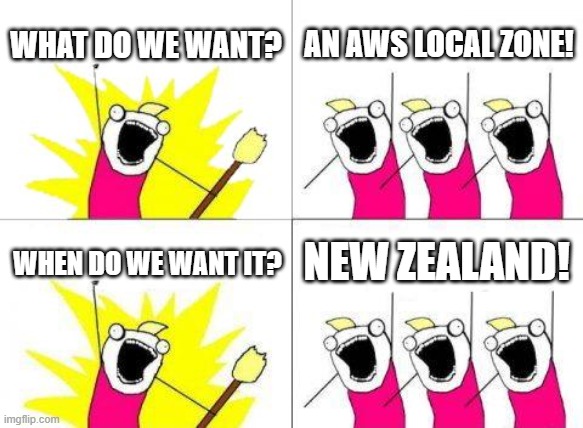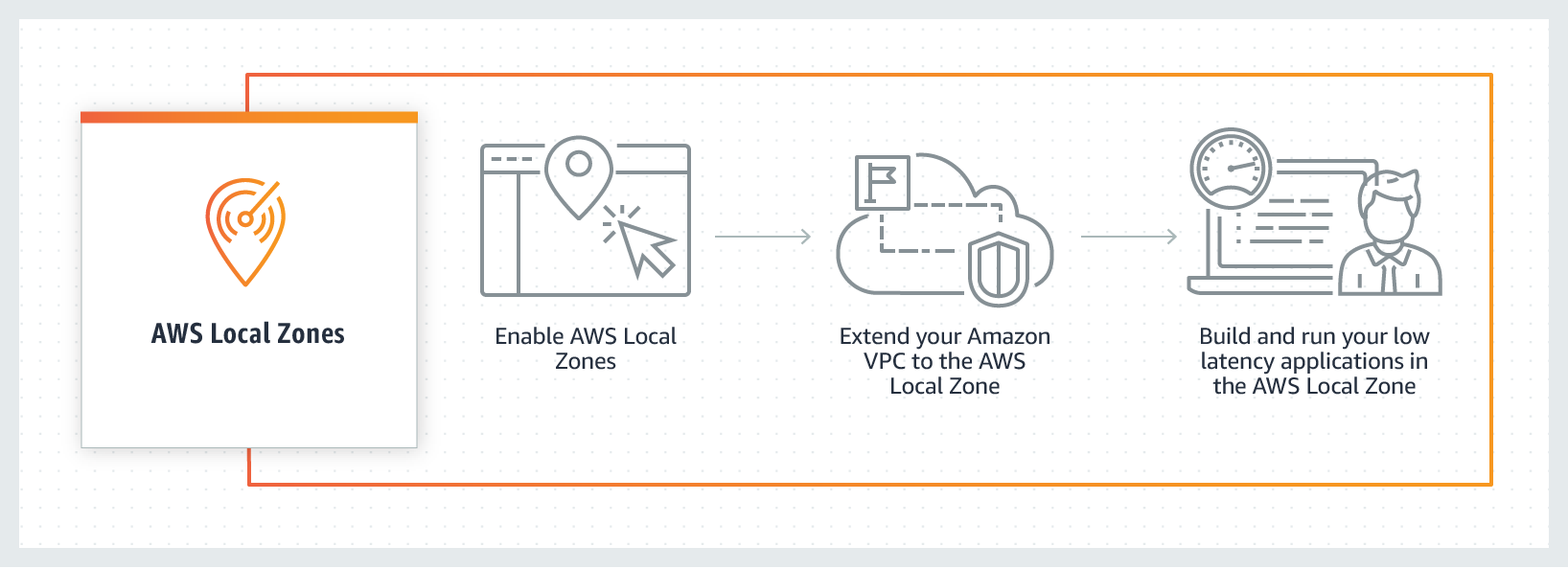What the AWS Local Zone Means For New Zealand
Posted by Chris McKinnel - 21 February 20225 minute read
In this post, I dig into what a Local Zone is, what specific New Zealand use-cases there are and why it's good news for New Zealand AWS customers.
I was running an immersion day last year and one of my new hires, Matt Johnston explained to me what an AWS Local Zone was. I'd never heard of a Local Zone before and thought it was an interesting idea, and then promptly forgot the conversation (but not before nicknaming Matt the AWS Encyclopedia).
Fast-forward a few months and there were some whispers about a big AWS announcement about to happen. There was a slow build up over a few weeks and we were all convinced that AWS were going to announce a Local Zone in New Zealand to combat the good press Microsoft were getting for announcing their on-shore region, and that they would try and launch first.
Holy Region, Batman!
We were all surprised to hear the full region announcement, and the large investment from AWS into New Zealand that came with it. But I must admit it was bitter-sweet because it came with a 2024 timeline. Awesome that we were getting our own region, but stink that we had to wait 3 years to be able to use it!
Local Zone Announcement
Last week AWS announced a Local Zone for New Zealand, in addition to the new region in 2024, but they didn't publish an expected launch date.
We can only speculate, but there is a good chance they will try and launch it sometime before the region is launched in 2024, meaning we've got less time to wait before we can run on-shore workloads in AWS.

So, what is a Local Zone exactly?
AWS Local Zones are a type of infrastructure deployment that places compute, storage, database, and other select AWS services close to large population and industry centers.
AWS Local Zone Official Website
Local Zones allow you to run workloads using foundational AWS services like EC2, EBS, ECS, EKS and VPC (and some extra services in some Local Zones - we don't know what we're getting in New Zealand yet), closer to your end users than was previously possible.
They actually sound pretty similar to AWS Outposts:
With AWS Outposts, you can run some AWS services locally and connect to a broad range of services available in the local AWS Region. Run applications and workloads on premises using familiar AWS services, tools, and APIs. Outposts support workloads and devices requiring low latency access to on-premises systems, local data processing, data residency, and application migration with local system interdependencies.
The two main differences being:
- Outposts are physical appliances that run in your data centre
- Outposts can run more AWS services, depending on the type you choose and how they're configured
Of course, not every organisation has (or wants) their own data centre.

Hybrid Cloud
They sit firmly in the list of AWS offerings that cater to the Hybrid Cloud use-cases where deploying workloads, in our case in New Zealand, to a remote AWS region like Sydney doesn't meet all of the requirements of the workload.
A recent example of this was one of my customers runs a legacy client-server application that's written in such a way that the client requires an extremely large number of calls to the server. If the latency on these calls were to increase even by a tiny amount, the calls stack on top of each other (because they're synchronous) and the end user experience degrades very quickly.
A number of the clients are fat clients, meaning they run an application on the user's machine and talk directly to the server.
There are ways to solve this problem without running the workload on-shore, but it changes the user experience. It sure would have been useful to be able to just move the server into a Local Zone (or into a local Availability Zone).
Use-cases for our new Local Zone
I was chatting with Cameron Tod from AWS today, and he mentioned the following use-cases that are specific to New Zealand customers that could be considered for the new Local Zone.
Low-latency for end-users
As discussed above, an obvious use-case is for when you need your
end-users to have low-latency comms with your application and you
don't want to change their user experience.
Using an on-shore Local Zone instead of sending traffic to Sydney will likely change your data's round-trip time from 30-50ms down to 10ms or less.
Data Residency
For years I've been hearing government departments say they must have
local copies of their data for business continuity, and iwi often have
a preference to keep certain data on-shore.
Some government departments prefer to keep everything on-shore, although this is slowly changing with the DIA advice to be "cloud-first" becoming more widely known and accepted.
With a Local Zone in New Zealand, you can keep your data on-shore in some cases, which might help navigate data residency issues.
Workload Resiliency
Running warm stand-by workloads in Sydney or the Auckland Local Zone
would increase resiliency, while also serving end-users from
a geographical location that's close to them.
Also having copies of backup data replicated to the Local Zone (or to Sydney) will speed up recovery times for low RTO / RPO workloads.
Other benefits
Given the parent-child relationship, and the free data transfer between
Sydney and the Auckland Local Zone, this might prove commercially
prudent for some workloads compared to transferring data between the
Sydney and Auckland regions.
Once our full region launches in 2024, it will likely be the case that all new workloads end up in one of the Auckland Availability Zones. However, for organisations that are based in Australia and do business in New Zealand (or organisations that decide to keep their resources in Sydney) may choose to keep existing, or to deploy new workloads in the Local Zone due to the relationship with it's parent, the Sydney region.
Good news for New Zealand
The continued level of investment into New Zealand that AWS is making sets the scene for a bright future. It's so great to be getting all of these local treats after years of convincing New Zealand businesses that running workloads in Aussie is legit!
It's not making hiring cloud specialists any easier, though.